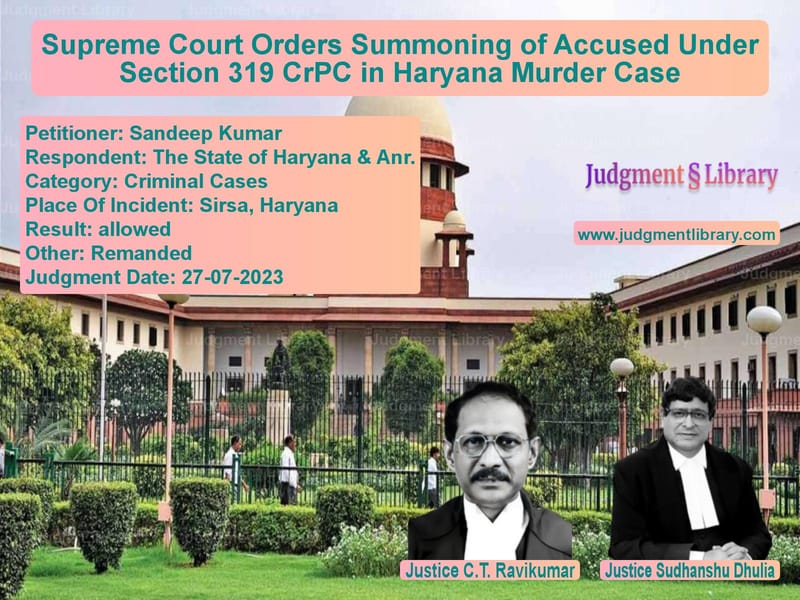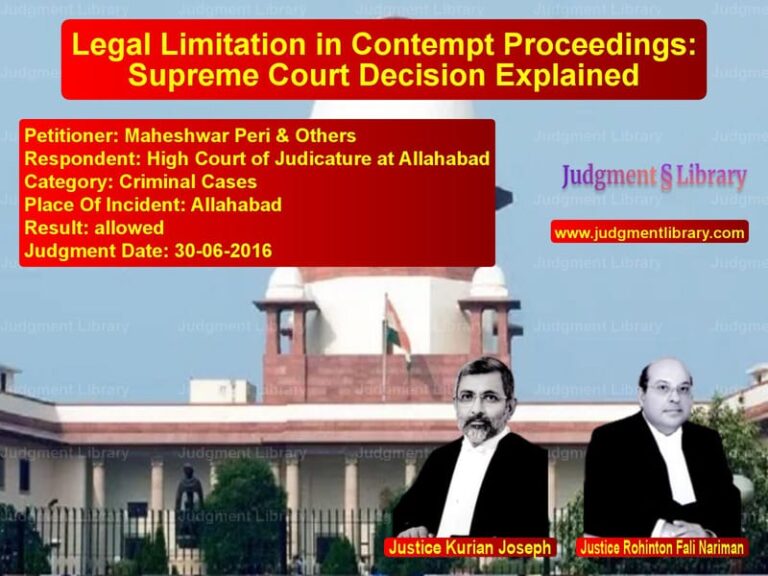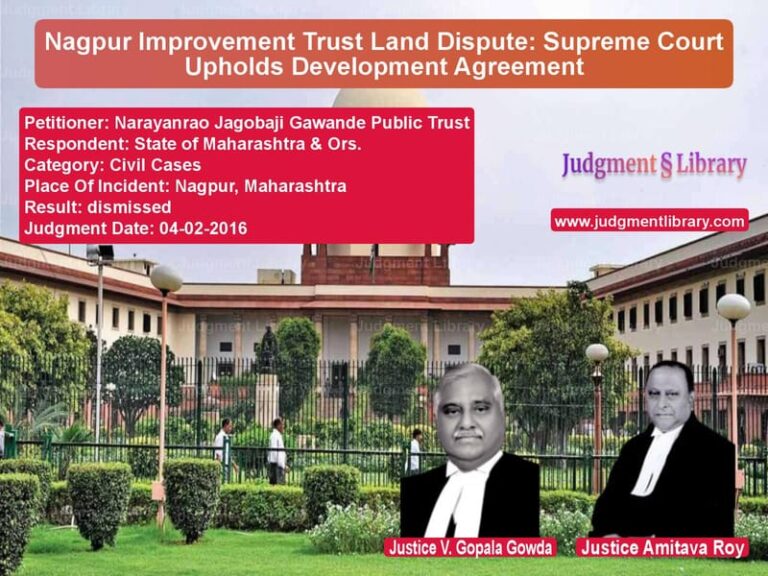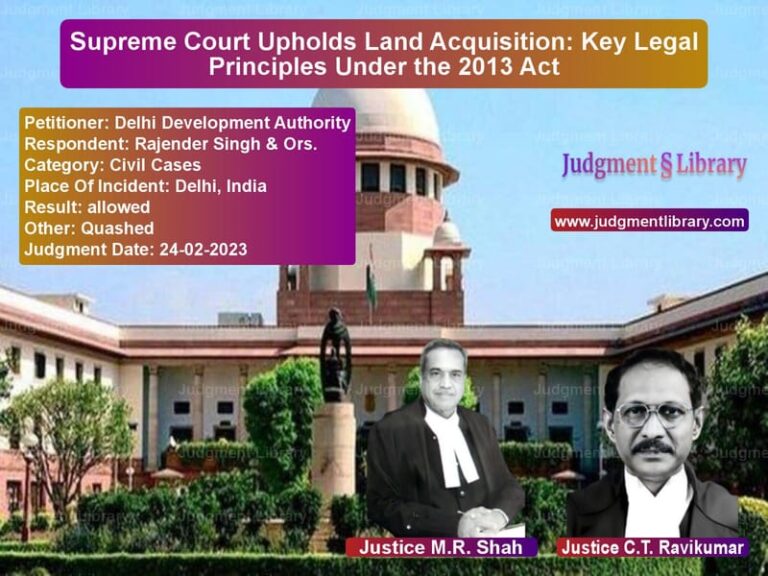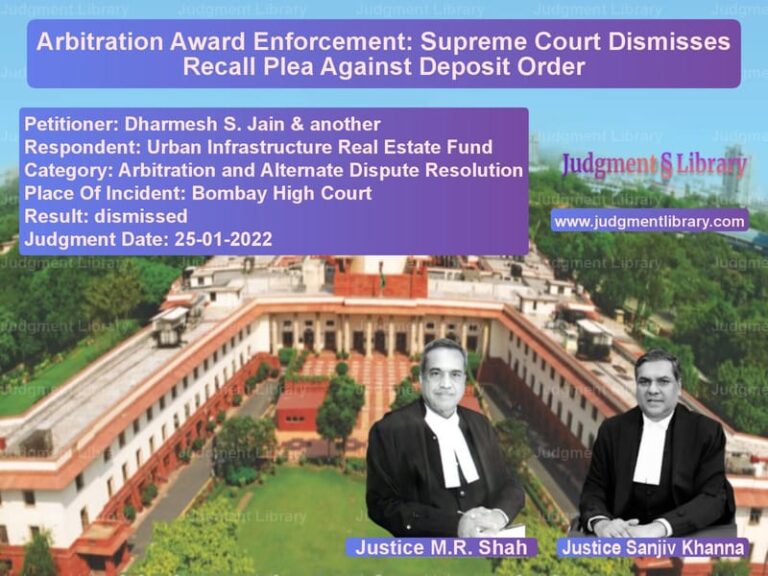Supreme Court Orders Summoning of Accused Under Section 319 CrPC in Haryana Murder Case
The case of Sandeep Kumar v. The State of Haryana & Anr. is a significant ruling where the Supreme Court exercised its powers under Section 319 of the Criminal Procedure Code (CrPC) to summon additional accused in an ongoing trial. The Court set aside the Punjab and Haryana High Court’s order, which had prevented summoning of individuals named in the FIR but not charge-sheeted. This judgment reinforces the principle that courts must ensure all guilty parties face trial when prima facie evidence exists against them.
Background of the Case
The case pertains to an incident that took place at 12:30 AM on September 7, 2017, in Sirsa, Haryana. The complainant, Sandeep Kumar, was an eyewitness to the crime and later became a prosecution witness (PW-9). According to the FIR, a total of fifteen assailants forcefully entered the complainant’s house in the middle of the night to attack the residents. Among these, seven individuals were named, including three accused—Ramesh Gandhi, Kalu Jakhar, and Pawan—who were allegedly armed with guns and pistols.
However, after the police investigation, the chargesheet was filed only against nine individuals, while Ramesh Gandhi, Kalu Jakhar, and Pawan were placed in Column 2, meaning no charges were filed against them.
Read also: https://judgmentlibrary.com/supreme-court-grants-bail-in-bhima-koregaon-case-key-takeaways/
During the trial, when Sandeep Kumar (PW-9) was examined, he reiterated his FIR statement and assigned specific roles to the three omitted individuals. Based on this evidence, he moved an application under Section 319 CrPC, seeking to summon them as accused.
The Trial Court allowed the application, directing the three accused to face trial. However, one of them, Ramesh Gandhi, challenged the order before the Punjab and Haryana High Court. The High Court overturned the Trial Court’s decision, stating that Gandhi was found innocent during the police investigation and that no direct evidence established his involvement.
Sandeep Kumar then appealed to the Supreme Court, arguing that the High Court’s decision wrongly prevented an accused person from facing trial despite clear prima facie evidence.
Key Legal Issues
- Did the Trial Court correctly exercise its powers under Section 319 CrPC?
- Did the High Court exceed its jurisdiction by interfering with the summoning order?
- Does the presence of an accused in the FIR, combined with witness testimony, justify summoning under Section 319?
Petitioner’s (Sandeep Kumar’s) Arguments
The petitioner contended:
- His testimony as PW-9 clearly established the involvement of Ramesh Gandhi, Kalu Jakhar, and Pawan in the crime.
- The High Court had wrongly assessed the evidence at the summoning stage when it should have allowed the Trial Court to conduct a full trial.
- Under Section 319 CrPC, the court has the discretion to summon an accused based on evidence emerging during trial, and the Trial Court had rightly exercised this power.
- The ruling in Hardeep Singh v. State of Punjab (2014) reaffirmed that summoning under Section 319 CrPC requires a higher degree of satisfaction than the mere filing of an FIR but does not require full-fledged trial evidence.
Respondent’s (Ramesh Gandhi’s) Arguments
The respondent, Ramesh Gandhi, argued:
- The police investigation had found him innocent, which justified his exclusion from the chargesheet.
- His mere presence in the FIR was not sufficient for summoning him as an accused.
- There was no direct evidence that he had used a firearm or inflicted injuries during the incident.
- The High Court had correctly intervened to prevent unnecessary harassment of an innocent person.
Supreme Court’s Observations
The Supreme Court carefully analyzed the Trial Court’s order, the High Court’s reasoning, and the evidence presented.
On the Scope of Section 319 CrPC
The Court reiterated that Section 319 CrPC empowers trial courts to summon an accused at any stage of the trial if evidence emerges that implicates them. It observed:
“Where, in the course of any trial, it appears from the evidence that a person not being the accused has committed an offense, the Court may proceed against such person.”
On the High Court’s Interference
The Supreme Court found that the High Court had wrongly assessed the evidence at the summoning stage, which was not its role. The Court held:
“The High Court committed a grave error in interfering with the summoning order. The merits of the evidence must be tested during the trial, not at the summoning stage.”
On the Role of the Accused
The Court observed that Sandeep Kumar’s testimony explicitly assigned a role to Ramesh Gandhi. It noted:
“PW-9’s examination-in-chief clearly implicated Ramesh Gandhi, Kalu Jakhar, and Pawan. The Trial Court was correct in summoning them based on this evidence.”
Final Judgment
The Supreme Court set aside the Punjab and Haryana High Court’s order and restored the Trial Court’s decision to summon the accused under Section 319 CrPC. The ruling directed:
- Ramesh Gandhi, Kalu Jakhar, and Pawan must appear before the Trial Court and face the charges.
- The Trial Court must proceed expeditiously with the trial.
Implications of the Judgment
This ruling has significant implications:
- Strengthening Trial Court Powers: Reinforces the Trial Court’s discretion under Section 319 CrPC.
- Preventing Premature Exoneration: Ensures that accused persons cannot escape trial based on police investigations alone.
- Clarification on Summoning Criteria: Reaffirms that an FIR and witness testimony can justify summoning under Section 319.
Conclusion
The Supreme Court’s decision in Sandeep Kumar v. The State of Haryana ensures that courts exercise their authority to bring all accused to trial when prima facie evidence emerges. The ruling prevents premature exoneration and strengthens the judicial process by reinforcing the powers of the Trial Court under Section 319 CrPC.
Petitioner Name: Sandeep Kumar.Respondent Name: The State of Haryana & Anr..Judgment By: Justice C.T. Ravikumar, Justice Sudhanshu Dhulia.Place Of Incident: Sirsa, Haryana.Judgment Date: 27-07-2023.
Don’t miss out on the full details! Download the complete judgment in PDF format below and gain valuable insights instantly!
Download Judgment: sandeep-kumar-vs-the-state-of-haryana-supreme-court-of-india-judgment-dated-27-07-2023.pdf
Directly Download Judgment: Directly download this Judgment
See all petitions in Attempt to Murder Cases
See all petitions in Judgment by C.T. Ravikumar
See all petitions in Judgment by Sudhanshu Dhulia
See all petitions in allowed
See all petitions in Remanded
See all petitions in supreme court of India judgments July 2023
See all petitions in 2023 judgments
See all posts in Criminal Cases Category
See all allowed petitions in Criminal Cases Category
See all Dismissed petitions in Criminal Cases Category
See all partially allowed petitions in Criminal Cases Category

